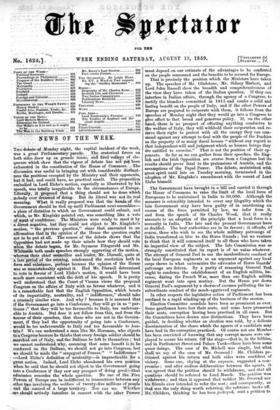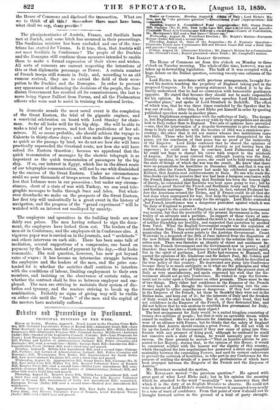The Government have brought in a bill and carried it
through the House of Commons to raise the limit of the local force of Europeans to be maintained in India to 30,000. Although the measure is ostensibly intended to cover any illegality which the late Government may have been guilty of in sanctioning an excess of the force permitted by law, we infer from it, and from the speech of Sir Charles Wood, that it really amounts to an adoption of the principle that a local force is a necessity, in India. The late and the present Government have so decided. The best authorities are in its favour ; it offends, of cotirse, those who wish to see the whole military patronage of India transferred en bloc to the Horse Guards ; but we venture to think that it will commend itself to all those who have taken tin impartial view of the subject. The late Commission was so strangely constituted that its report is of no value whatever. The attempt of General Peel to use the insubordinate conduct of the local European regiments as an argument against any local corps shows to what extremities the advocates of Horse Guards' patronage are driven. By a parity of reasoning General Peel ought to Condemn the establishment of an English militia, be- cause, Airing the French War, more than one English militia regiment went into open mutiny. But the House put down General Peel's argument by a chorus of excuses palliating the in- subordinate conduct of the mach-aggrieved regiments.
In other respects the legislative action of Parliament has been confined to a rapid winding-up of the business of the session.
Election Committee scodals have been as prominent as ever. Some gentlemen have lost their seats, and some have preserved their Aeati, corruptionhaving been practised in all oases. But the Committees have dra,Wn nice distinctions. They have been guided, in deciding whether an election was void, by a delicate discrimination of the share which the agents of a candidate may have had in the corruption practised. Of course not one Member • has-been convicted of knowing that any corrupt means were em- ployed to secure his return. Off the stage—that is, in the lobbies, and in Parliament Street and Palace Yard—there have been some queer doings. • The case of Dr. Michell was simple, but what shall we say of the case of Mr. Overend ? Mr. ehilders pe- titioned against his return and both sides were confident of
victory. Some one, shying at the expense, suggested a com- promise ; and after endless deliberations between the agents, it was agreed that the petition should be withdrawn, and that all quektioUs should be referred to Lord March. The petition was withdrawn ; and then it appeared that neither Mr. Overend nor
his friends ever intended to refer the seat ; and consequently, as that was the only thing worth referring, the reference broke off. Mr. Childers, thinking he has been jockeyed, sent a petition to the House of Commons and disclosed the transaction. What are we to think of all this ? Soineseisrre there mast hue been, what shall we say, sharp practice ?



























 Previous page
Previous page